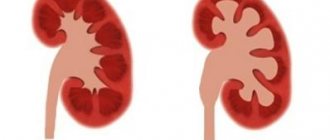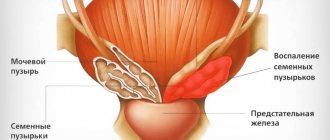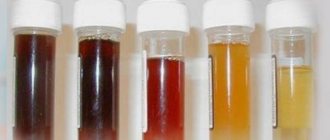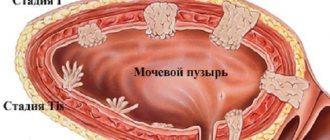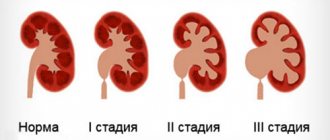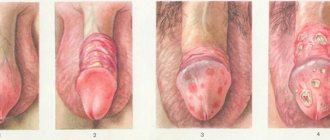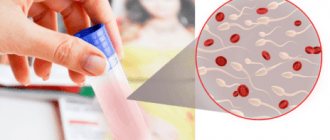Men do not like to get sick, and even more so when it comes to urological diseases. However, if you ignore the symptoms of urological pathologies or self-medicate, you may encounter serious consequences and complications.
For this reason, men after 25-30 years of age are recommended to undergo regular preventive examinations with a urologist, and if you suspect that male urological diseases have appeared, you should immediately contact specialists at the Urology Clinic named after. R. M. Fronshteina.
The most common diseases of men
Problems of the genitourinary system are something that every second man has to face. Which of them are the most common?
Prostatitis and prostate adenoma
The prostate in men is located between the rectum and bladder. Its main function is to produce a special secretion (PSA), which is responsible for sperm formation. Prostatitis (inflammation of the prostate) and prostate adenoma (pathological growth of the organ) are diseases of 50% of men after 40 years.
Urolithiasis and pyelonephritis
Every fourth man aged 25–50 years is susceptible to urolithiasis. Stones in the kidneys and bladder are formed due to metabolic disorders, poor diet, bad habits, working conditions, etc.
Pyelonephritis is an inflammation of the kidneys. It is often a consequence of hypothermia, a complication of urolithiasis, prostatitis and prostate adenoma. A distinctive symptom that the kidneys are not in order is swelling of the face and eyelids.
Varicocele
Testicular diseases are less common than prostate diseases, but no one is immune from them. An organ so important for men is injured, exposed to overheating and hypothermia. And some, to be honest, suffer from unsanitary conditions. Among the popular pathologies of the testicles is varicocele.
Varicocele affects 15–20% of men, mostly teenagers during puberty. The disease is varicose veins in the scrotum area. This anomaly provokes a disruption of the blood supply, which means a lack of oxygen and an increase in temperature in the delicate area. As a result, the reproductive function is disrupted. By the way, half of infertile men are also diagnosed with this disease.
A urologist treats the prostate, urinary tract, and testicles. You need to make an appointment with him if you have:
- lower back pain and problems with urination, incontinence, false urges, pain, change in urine color;
- purulent, bloody and other pathological discharge;
- narrowing of the foreskin (phimosis), erectile dysfunction;
- weight loss;
- hardening of the testicles, enlargement of the scrotum, discomfort during erection.
Symptoms and methods for diagnosing pathologies of the genitourinary system
Although urology includes a wide range of diseases, most of them have similar symptoms. At the first stage of the development of the disease, difficulty urinating, pain and burning when urinating, pain in the lower abdomen and genitals appears. The patient feels a frequent urge to urinate. There is blood or cloudy impurities in the urine.
As the condition worsens, the temperature rises to +40°C. Pus is released from the urethra, sharp pain in the lower back and urinary retention occur.
You should consult a doctor no later than 2 days after the first symptoms appear. The urologist begins the examination with examination and palpation. Various urological tests may then be ordered, including:
- General and biochemical urine analysis - allows you to determine the condition of the urinary system as a whole, to identify the presence of impurities and bacteria.
- Urethral smear - performed in case of inflammatory diseases to determine the causative agents of infection.
- Cytology is an in-depth analysis of urine that helps detect pathogenic microbes and abnormal cells.
- Kidney test - examines urine taken through a catheter. The analysis makes it possible to diagnose renal failure.
- Cystoscopy is an examination of the inner lining of the urethra and bladder using a cystoscope. It is carried out for chronic infections of the urinary tract, the presence of blood in the urine, and suspected cancer.
For serious renal disorders, a computed tomography scan is prescribed. It helps determine the presence of stones and kidney failure. Examination of the kidneys and ureters is done using a pyelogram or urogram. During these procedures, medical dye is injected into a vein. A special device monitors the progress of the colored liquid, recording pathologies.
For problems with the prostate gland, tests of prostate secretions and a rectal examination are performed. If a man complains of sexual dysfunction or infertility, a spermogram is performed - a study of the composition and quality of seminal fluid.
The most terrible ailments of the stronger sex
Did you know that the hardest thing for men to do is see a specialist with problems in the sexual sphere? But this is what the representatives of the stronger sex are most afraid of.
Male infertility
The diagnosis of infertility is given to couples who have been trying for more than a year but cannot conceive a child. In 50% of cases the reason is the man. And if a woman is struggling with a disease, her husband often does not even try to discuss the issue. The result of stubbornness is serious problems in the family, even breaking up. Meanwhile, modern medicine makes it possible to identify and improve sperm quality indicators, restore reproductive function, and offer alternative methods of conception. Alas, not everyone knows this.
erectile disfunction
Or impotence, a disease common to 5 million Russian men. May be permanent or periodic.
A man is often in no hurry to admit this delicate problem even to himself. At first, he attributes everything to stress, fatigue, and “bored” family relationships. Then he begins to “treat” impotence on his own, believing that this is the only way out. This should not be done; with such a disease, the best result will be obtained from the help of a doctor.
An andrologist deals with problems of infertility, erectile dysfunction, decreased sexual desire, underdevelopment of the gonads, as well as aesthetic defects in the intimate area.
Diagnostics
Of course, no urologist will be able to qualitatively assess the patient’s condition based only on an external examination and the patient’s story about how he feels. For an objective assessment, the urologist will need diagnostics and results of urine and blood tests.
The GMS Clinic medical center provides comprehensive diagnostics of urological diseases using the most advanced and highly informative laboratory and instrumental techniques, such as:
- Ultrasound of the kidneys, bladder, prostate, scrotal organs (performed by a urologist immediately at the appointment);
- nurethrocystoscopy;
- radiography, intravenous urography and cystography, CT, MRI;
- biopsy;
- uroflowmetry (performed by a urologist immediately at the appointment);
- general and biochemical blood and urine tests;
- bacteriological tests of blood, urine, semen, urogenital tract secretions;
- PCR;
- immunological studies;
- spermogram;
- short and full screening.
Having our own laboratory and diagnostic equipment allows us to carry out the entire range of studies in the shortest possible time.
The most unexpected diseases
According to statistics, at least once in their life, every representative of the stronger sex visited a dermatovenerologist. Moreover, even those who carefully protect themselves, in case of deviations in the functioning of the reproductive system, will first of all go to this specialist. What “surprises” does this doctor most often find?
The most popular sexually transmitted diseases (STDs) are syphilis, chlamydia and human papillomavirus. Signs of sexually transmitted diseases in 80% of cases appear after unprotected sex with an unreliable partner. The period is from several days to several months.
| Incubation period of STDs | |
| Syphilis | 3–4 weeks |
| Gonorrhea | 3–5 days |
| Chlamydia | 6 days - 1 month |
| Trichomoniasis | 5–15 days |
| Papillomavirus | 2–3 months |
| HIV | Get tested - no earlier than six months later |
Symptoms of STDs are:
- burning, itching, discomfort in the groin area (intensified by urination);
- rashes, ulcers, redness;
- discharge from the penis;
- formations similar to cauliflower;
- itching, rash, spots, redness of the skin.
If you notice such signs, refrain from unprotected contacts with your regular partner and seek diagnostics.
Female urological diseases
There are urological diseases that women are more susceptible to. For example, such a pathology as cystitis, which perhaps every woman is familiar with (according to statistics, approximately a third of women aged 20-40 years experience an attack of cystitis at least once a year), it is almost not observed in men.
Women may also be diagnosed with overactive bladder or urinary incontinence, which can cause quite a lot of inconvenience and discomfort.
Physiological changes during pregnancy can also cause problems with the urinary system.
Some uropathologies are associated with the onset of menopause - estrogen deficiency leads to atrophy of the tissues of the urogenital tract, and urinary incontinence is noted. Often the situation is complicated by infection. Inflammatory diseases of the pelvic organs in menopausal women have their own characteristics and require a special approach to treatment.
Anatomically and physiologically, the urinary and reproductive systems are closely related.
Urological diseases can pose a threat to reproductive plans and vice versa. Therefore, urological health is not only part of overall well-being, but also an important component of the body’s readiness for reproduction. This applies to both men and women. Often, treatment of urological diseases in women is carried out with the participation of a gynecologist. It is important to correctly differentiate acute inflammatory diseases of the pelvic organs, separating urological pathology from gynecological pathology.
To determine the cause of the illness, the doctor will ask in detail about the symptoms. Perhaps he will prescribe tests - a general urine test, bacteriological culture for sensitivity to antibiotics, and others. For specific studies, the patient may be recommended cysto- or urethroscopy, as well as ultrasound of the pelvic organs (preparation for women is described below). In some cases, it is recommended to keep a urological diary to record the amount of fluid drunk and excreted.
About the prevention of male diseases
It is impossible to protect yourself from all male ailments. But it is quite possible to reduce the risk of disease by following some preventive measures:
- Follow the rules of a healthy diet: less fried, spicy, smoked, salty. Remember, obesity is one of the causes of erectile dysfunction!
- Give up bad habits.
- Do not get carried away with visiting the sauna or bathhouse. After the steam room, douse yourself with cool (but not ice-cold) water to avoid overheating.
- Use a condom for casual contact.
- Do not use the method of interrupted coitus. This can affect the prostate and sexual desire.
- If you have injured your testicles and feel pain the next day, be sure to consult a specialist.
- Maintain hygiene, wear comfortable underwear made from natural fabrics.
- Do not delay visiting your doctor if you notice abnormalities in the functioning of the genitourinary system.
- Get a preventive examination from a urologist during adolescence and after 35. (paid urology)
The stronger sex also sometimes needs help. Therefore, for diagnosis of male diseases, consultation, and effective treatment, come to Best Clinic. Remember that in the early stages everything can be treated. Take care of your health, make an appointment!
You definitely need to consult a urologist if the following symptoms appear:
- difficult, frequent, sluggish urination, feeling of incomplete emptying of the bladder, urinary incontinence;
- presence of impurities in urine (blood, mucus) or semen (blood);
- discharge from the urethra;
- trauma to the genitourinary organs;
- itching, burning, pain and discomfort when urinating;
- pain and discomfort in the lower back, perineum, genitals, lower abdomen
If any of these symptoms are present, a visit to the urologist is considered mandatory.
Diagnosis and treatment of urological diseases in Moscow
The Urology Department of the Russian State Scientific Center provides qualified medical care to patients of any age. The Russian State Scientific Center is the leading gerontological center in Russia, where a special approach to the treatment of the older age group is carried out, taking into account all the characteristics of geriatric patients.
In the treatment of urological patients, both conservative methods, including medications, exercise therapy, physical therapy, and surgical methods can be used. Qualified urologists in our department are proficient in open, laparoscopic and minimally invasive surgical techniques.
The treatment method can be chosen after a detailed examination. The clinic is equipped with modern diagnostic equipment that allows us to conduct all the necessary instrumental studies: ultrasound of internal organs, excretory urography, computed tomography (CT), uroflowmetry, endoscopic therapeutic and diagnostic interventions using rigid and flexible endoscopes, complex urodynamic studies. Treatment with laser technology and other high-tech procedures are also carried out.
Androgen deficiency
Age-related androgen deficiency, also called male menopause, is insufficient production of the hormone testosterone, the main male hormone. Symptoms of androgen deficiency sometimes resemble symptoms of the disease so little that men simply attribute everything to fatigue, workload, bad mood and, of course, age. Here are the changes that should alert you: decreased libido, weakened erection and orgasm; decrease in muscle mass, strength and energy; increase in fat mass; increased fatigue, weakened memory; reduction in the amount of hair in the armpits and pubic area, slower beard growth; raising the timbre of the voice; reduction in testicular size; prostate diseases and osteoporosis; weakness, depression, irritability.
FACT:
If a man’s waist circumference is more than 94 cm, we can say with almost 100% certainty that he has problems with testosterone.
Diagnosis of androgen deficiency involves measuring testosterone levels, which have clear limits. Testosterone levels can be increased through stimulation therapy or medication. Stimulating therapy is aimed at enhancing the synthesis of your own testosterone. The arsenal of drug therapy includes tablets, injections, testosterone gels. Each method has its own pros and cons; the choice of remedy depends on the patient’s individual indications.
Don't put up with the problem, remain a man!

